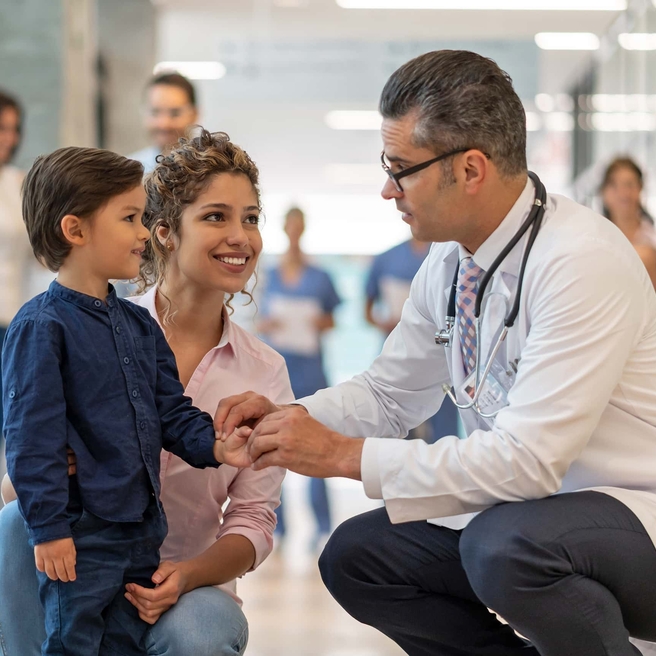Answers to these frequently asked questions about orthopox (monkeypox) may help you better understand the virus. If you have additional questions, we encourage you to contact your primary care provider.
What are the symptoms of monkeypox?
Early signs of monkeypox may include:
- Fever
- Chills
- Headache
- Muscle aches
- Fatigue
- Swollen lymph nodes
- A rash (red, slightly raised bumps) usually develops after a few days. These bumps may be painful and will eventually turn into pus-filled blisters. The blisters will form scabs as they heal.
Symptoms typically last two to four weeks. A person is considered contagious until all scabs have fallen off and a fresh layer of skin has formed.
Am I (or my children) at risk of monkey pox?
Most people are at low risk of contracting monkeypox. Monkeypox is mostly spread by individuals who have had close, intimate contact with contagious individuals. Monkeypox is mostly spread through:
- Direct contact with infectious rash, scabs or body fluids
- Prolonged intimate or face-to-face contact
Contact with objects that have been used by a contagious individual can also possibly spread monkeypox, but this is much less common.
These interactions have not been reported as the cause of any current monkeypox cases:
- Short interactions, such as a brief conversation, with someone who is positive
- Close proximity, such as sitting on an airplane, with someone who is positive
What should I do if someone I know has monkeypox?
An individual infected with monkeypox should isolate from other people. You should avoid:
- All close, skin to skin contact with that person
- Touching any clothes, sheets, towels, or other materials that they might have used
- Using any utensils, plates, or cups that the infected person may have used
If the person with monkeypox lives in your home, they should:
- Isolate from those who are not infected, including pets
- Wear a well-fitting mask if they are older than 2 and cannot isolate from others
- Cover their rash with long pants and sleeves
Caregivers should:
- Wear a mask if they will be around the infected individual for more than a short period of time
- Wash their hands after any contact with an infected individual, even if you have worn gloves
Who should get the monkeypox vaccine?
The monkeypox vaccine should not be given to everyone. Doctors may consult with the local health department to determine who might benefit from the monkeypox vaccine. This might include patients at high risk of exposure, patients at high risk of getting very sick, or patients with certain jobs that put them at higher risk.
Vaccination is most effective within four days of exposure, but it can also help up to 14 days after exposure. The monkeypox vaccine is a two-dose series given at least 28 days apart. At this time, most vaccines are given by county departments of public health. If you would like more information about the monkeypox vaccine, please contact your local county or state department of health.
I was exposed to monkeypox. What should I do now?
If you have been exposed to monkeypox and do not have symptoms, you should:
- Watch for the following symptoms: Fever, muscle-aches, headaches, fatigue and swollen lymph nodes. These symptoms usually develop anywhere from five to 21 days after exposure. A rash on the face, hands and/or feet will usually develop one to four days after the initial symptoms.
- Keep in mind, people are not at risk of infecting others with monkeypox when the virus is in its “incubation” phase, or before the infected person starts having symptoms. As long as you do not develop any symptoms, you can continue routine daily activities, such as work and school.
If you have been exposed to monkeypox and develop symptoms, you should:
- Isolate from others (see above), and contact your primary care provider. Your primary care provider, in partnership with your local public health department, will discuss with you testing, vaccination and/or the need for any antiviral treatment.
- Remember to isolate until the rash has fully resolved, the scabs have healed and a fresh layer of skin has formed.
Who should be tested for monkeypox?
Not everyone needs to be tested for monkeypox. In Pennsylvania, your provider will decide if you need a test based on your individual information. If you don’t have a health care provider, you can contact your local department of public health for help.
What is the treatment for monkeypox?
Most people who are diagnosed with monkeypox recover without any treatment. Healthcare providers will monitor symptoms and help make sure patients do not become dehydrated. If a patient with monkeypox develops a bacterial infection, they may need antibiotics. Immunosuppressed individuals who test positive for monkeypox may be prescribed an antiviral called Tecovirimat (TPOXX).
Find additional clinical care resources for healthcare professionals.
Resources to help
Division of Infectious Diseases Resources
We have gathered resources to give you information and help you find answers to your questions. We hope this makes your family's life a little easier.
